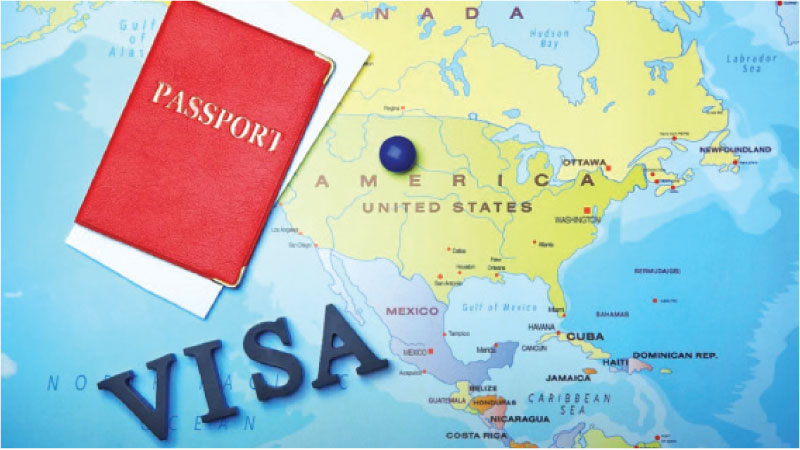 Is it difficult to imagine a visa-less future? As things stand, Sri Lankans not having to obtain visas for travel is becoming increasingly a thing of the past.
Is it difficult to imagine a visa-less future? As things stand, Sri Lankans not having to obtain visas for travel is becoming increasingly a thing of the past.
Visas are needed, and are particularly required from people of certain countries that are deemed to harbour less than reliable travellers. Therefore, applying for visas has become a tedious process where those such as Sri Lankans often have to languish for months on end in a hellscape that’s called a visa waiting period.
This worldwide regime of unfair travel opportunities has never been challenged in any global forum. There is nobody taking up such a cause in an international Court, or any UN body, probably because they know there is no real chance of success.
After all, visas are said to be the prerogative of a State. The world is sadly hierarchical when it comes to matters of who is to be let into which countries, and when. Take the Rohingyas, for instance.
For no fault of their own, they have been international pariahs. They have become Stateless because the country they have been living in for a long time doesn’t want them, because they are said to be infiltrators or refugees from a nearby country.
But the world has not been listening essentially, or been bothered. Of course, the world treats citizens of various countries with varying degrees of respect when they want to travel.
Requirements
Passports are in general classified as strong and weak. The weak ones are of countries that require stringent visa requirements for travel to various other countries. However, some countries have hardly any visa requirements for travel to the majority of nations, because most nations have opened their borders to visitors from these better placed nations.
This visa apartheid is applied globally with nary a whimper of protest from anyone, least of all the countries that are affected.
This is because this system of valid permits for travel globally, has been seen as the norm due to expediency. The countries which welcome tourists from abroad justify visa-waivers on grounds of welcoming travellers that can spend the money.
Nobody has thought for a moment whether these types of restrictions imposed on travel is either humane or fair. Fair doesn’t even enter the lexicon when there is dialogue on these matters.
Placing such travel-bans — severe visa restrictions are effectively travel-bans — does not apparently deter any of these nations that impose such severe restrictions from flaunting their human rights record, or their love for democracy, free speech and equal rights for everyone, all of which are concomitants of democracy.
Apparently, restricting people from travelling, even when they can pay for it, is not a problem that impedes any record on human rights, or upholding democratic values. It is par for the course for democratic countries to deprive people of travel opportunities, sometimes even when it concerns issues of sickness and death. Notoriously, people have been deprived of visas when it comes to visiting ailing relatives or attending funerals.
That all this is applied very selectively, bothers nobody. There is no discussion on this subject at global forums. It is not a human-rights issue at all, and does not so much as pique the curiosity of the UN Commissioner for Human Rights.
Of course, people overstaying in countries or looking for jobs to settle down in the so-called industrialised world is a real problem. Those from countries with poor economic performance have always wanted to better their lot by migrating to economically well-off countries, and if that cannot be done legally, they are prone to do it illegally.
Could the richer countries be blamed for not being very welcoming when people want to visit their countries? Not exactly of course, in the aforementioned circumstances.
However, though there are offenders, there are genuine travellers too, and as stated earlier, people who have the means should be able to go wherever they want, particularly when they are travelling for a good reason, such as visiting a sick or dying person, for instance.
With today’s technology, is there any reason that visa restrictions should apply any longer? People should be let into countries entirely visa free, because it would if not at present, at least in the very near future, be possible to monitor a person for validity of stay at any time, in any part of a country.
It can be made virtually impossible for people to evade forms of detection. They could be monitored by facial recognition, or through multiple other means. With Artificial Intelligence and robotics being as advanced as these technologies are now, redundancies could be created in ways in which people could be monitored for overstaying in a country.
The fact that richer nations want illegal immigrants to remain under the right conditions, is another example of the rank hypocrisy with regard to visa policies that some such countries follow.
If overstayers are willing to do certain so-called menial jobs such as crop-picking under harsh conditions, for instance, such people are allowed to stay on in certain counties, even though they are never made legal residents. As a result, these people often enjoy no rights, because they are not legal citizens or residents, and never will be.
But by ignoring their status, certain Governments are able to supplant the need for certain types of manual labour, and this is in and of itself a violation of the basic rights of people to enjoy the most rudimentary of privileges in their places of residence.
But immigration is all about imbalances of power in the modern day and age, and how people in so-called disadvantaged circumstances are sometimes dehumanised or exploited, when they want to travel or stay in foreign countries.
With modern technology, perhaps there would very soon be a situation in which passports as we know them don’t need to exist. Maybe, people could be tracked by fingerprints, and matching these impressions with massive databases.
Some of these methods can be seen as intrusive and not very humanising as a result. But what’s better, is it being denied entry to countries even if people have a legitimate reason to travel, or to have systems that make use of modern technology, even though there may be intrusive elements to these new technologies?
If economic disparities disappear, xenophobia would disappear too. People would be able to travel anywhere and citizens would not be paranoid about illegal immigration and related issues.
But it is not an ideal world, and it is hard to think that the system of borders as we know it would disappear anytime soon.
But the odious system of strong passports and weak passports, needs to be a thing of the past. If countries are proud about new technologies at their disposal, they should be able to easily track who comes in and who overstays, making it virtually impossible for anyone to evade the radar as it were.
Responsibility
Countries should also be made to take a measure of responsibility with regard to their immigration policies. If they want some illegals to stay, they should not be treated as non-persons or Stateless persons who have no rights and can be asked to go back to their countries of origin at any point in time.
Countries that make use of cheap immigrant labour should not be permitted to have the cake and eat it too. If they want to avail themselves of cheap labour, concomitant rights should be afforded to people who cross borders to do the jobs that few people want.
The systems of borders, passports and visas so far as things stand, are a disgrace to humankind. It is even more disgraceful that there is no polite discourse about how such a system can be reformed to enable people of any country, living under any circumstances, to be allowed to travel without let or hindrance. The world after all was created without borders, and borders are merely human inventions.







